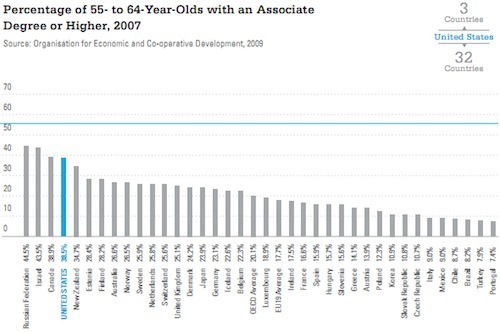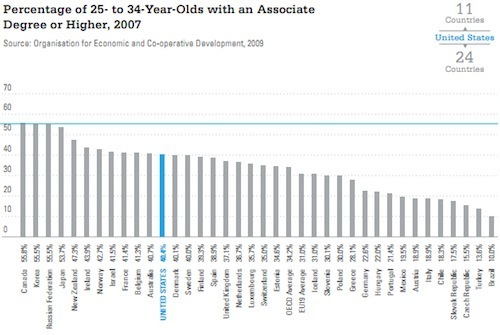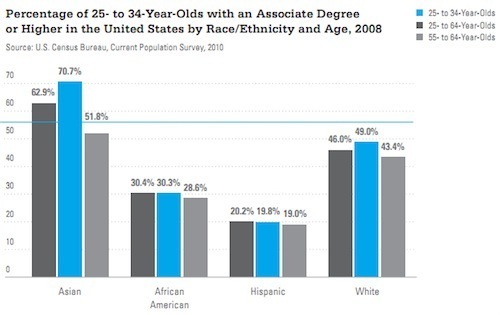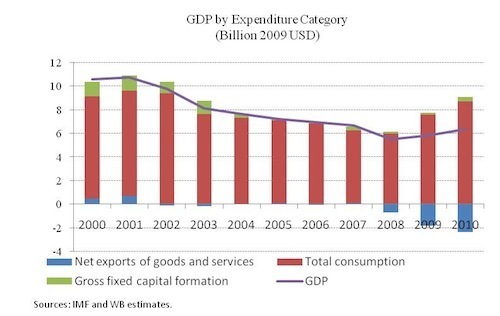Matthew Yglesias's Blog, page 2297
May 25, 2011
Fiscal Summit Day!
Today is the Pete Peterson Foundation's 2011 Fiscal Summit at which sundry worthies will be speaking and your humble blogger will be in attendance.

The highlight of the proceedings, to me, is that a number of thing tanks—including CAP—will be releasing their long-term budgetary visions. I know a bit about what's in our document, and very little about what's in the others, but I think our plan's a good one and I'm eager to share some details about it on the blog when it's released officially. But I'll just say as a preamble that the way our fiscal team went about this was not to think about a "balanced budget plan." It's a plan to delivery broadly shared prosperity in an ecologically sustainable way. That means a government that spends on things that are important, and doesn't spend on things that aren't important. And it means a tax code that raises enough revenue, and does it in an economically smart way. But if you don't have that kind of grounding, what you wind up with is a lot of arbitrary numbers.


Caregivers Using Copyright Law To Shield Themselves From Public Criticism From Patients

Tim Lee reports on a weird new trend in health care where some medical professionals are refusing to treat patients who don't sign a form restraining their ability to comment on the quality of service provided:
When I walked into the offices of Dr. Ken Cirka, I was looking for cleaner teeth, not material for an Ars Technica story. I needed a new dentist, and Yelp says Dr. Cirka is one of the best in the Philadelphia area. The receptionist handed me a clipboard with forms to fill out. After the usual patient information form, there was a "mutual privacy agreement" that asked me to transfer ownership of any public commentary I might write in the future to Dr. Cirka. Surprised and a little outraged by this, I got into a lengthy discussion with Dr. Cirka's office manager that ended in me refusing to sign and her showing me the door.
The good news here, such as it is, is that this kind of agreement is probably toothless under the law.


May 24, 2011
Endgame
I think you're cute:
— Great places.
— Italy's economic doom may doom the European banking system.
— Chris Christie is unpopular.
— The correlation of everything with everything.
— Pharmaceutical R&D turns out to be hard.
— Complicating the Congo rape story.
The Eames Era, "Watson On Your Side".


Liberal and Conservative Brains
Via Erik Voeten, Darren Schreiber, Alan Simmons, Christopher Dawes, Taru Flagan, James Fowler, and Martin Paulus of UCSD report on the neurological correlates of political partisanship (PDF):

We matched public voter records to 54 subjects who performed a risk-taking task during functional imaging. We find that Democrats and Republicans had significantly different patterns of brain activation during processing of risky decisions. Amygdala activations, associated with externally directed reactions to risk, are stronger in Republicans, while insula activations, associated with internally directed reactions to affective perceptions, are stronger in Democrats. These results suggest an internal vs. external difference in evaluative process that illuminates and resolves a discrepancy in the existing literature. This process-based approach to political partisanship is distinct from the policy-based approach that has dominated research for at least the past half century. In fact, a two parameter model of partisanship based on amygdala and insula activations achieves better accuracy in predicting whether someone is a Democrat or a Republican than a well established model in political science based on parental socialization of party identification.
We're seeing more and more of this kind of effort to approach political science through a life science lens, and I think it would be interesting to see more integration of this kind of work with some of the crude stylized demographic facts about American politics. A married 60 year-old regular churchgoing man is overwhelmingly likely to be a Republican if he's white, but a Democrat if he's black. Do you see this same neurological divergence within that kind of sub-sample?


Replacing Park-and-Ride Lots With Transit-Oriented Development
I don't know all the details, but the MacArthur BART Transit Village project seems to me to be an example of roughly doing it right, replacing a parking lot with actual houses and stores and stuff for people to live in.
Beyond the micro-details of planning, this illustrates the thing that's wrong with a lot of proposals I've seen to "privatize" parking lots owned by transit agencies. The way you privatize a parking lot is to sell the parking lot to someone who, as the owner of the land, now has the right to redevelop it as something that's not a parking lot. What they're considering instead in New Jersey, for example, is to basically privatize the operation of the parking lot, which is a very different matter that still leaves you with a parking lot.


Senate Republicans Flinching From House GOP's Medicare Repeal Proposal
Senate Republicans don't yet seem to have adopted the kind of strong party discipline that prevails in the House, with Scott Brown and Olympia Snowe already pledging to vote no on the Paul Ryan Medicare repeal budget and several others including Susan Collins, Lisa Murkowski, and Mark Kirk sending wishy-washy signals. Suzy Khimm observes that "defections are likely to embolden Democrats, some of whom are already predicting that Medicare will be the defining issue of the 2012 elections."
More than that, defections themselves create problems for non-defectors since voters engage in a lot of heuristic-based reasoning. The fact that Olympia Snowe is against Medicare privatization makes it harder for Susan Collins to be for it. If Collins, Snowe, and Brown all defect that makes it harder for Kirk to avoid defecting. But if Kirk defects, that's a problem for Illinois House Republicans in swing districts. One should never overstate the influence of issues on elections, but insofar as issues do matter this kind of thing about how they get coded makes a difference.


Your Better Life
Via Alex Tabarrok, the OECD's Your Better Life index lets you weight how much you care about different variables and tells you where you ought to live. Australia, Canada, and Sweden are my top three which seems about right.


America Falling Behind In College Completion
It's difficult to talk about "college degrees" in the abstract, and the problem only gets worse when you turn that into an international comparison. But I think conversations about whether or not college is "worth it" or whether we're having a "bubble" in higher ed benefit from some information on international comparisons. Fortunately, the Yglesias Blog has a new intern this week, Matt Cameron, who helped me find this report from the College Board (PDF) which has a lot of interesting charts.
For starters, if you look at older workers America nearly leads the world in college degrees:

But among the youngest cohort, that's not the case:

And if you look at the racial and ethnic breakdown, it looks like one factor in the stagnation is the fact that the Hispanic share of the population has grown over time but Hispanic college attainment hasn't:

No huge policy insight from me for now, but it's a reminder that more high-skill immigration would be in our interest.


Review: 'The Last Mountain'
By Alyssa Rosenberg
There are at least three potentially good movies in The Last Mountain, Bill Haney's documentary about environmentalists' fight against mountaintop removal mining in West Virginia: the story of how Don Blankenship became a twenty-first century Gilded Age baron, and how coal companies built a business model that included paying fines rather than avoiding violations; a look at what it means for people in Appalachia to demand accountability from the West Virginia government; and a history of the Kennedys and the environmental movement. But The Last Mountain is just one movie, and while it does a valuable service in laying out some of the environmental impacts of the coal industry and spotlighting the work of Appalachian activists, it never quite knits those stories together, leaving them competing with each other for time.
It's incredibly striking to see what the mountaintop removal process actually looks like. "If you blew up one mountain in the Berkshires, you wouldn't be put in jail," Robert F. Kennedy, Jr., who stars in the movie along with local activists, told me. "You'd be put in an asylum for the criminally insane." After seeing the explosions and the scale of the projects, it's hard not to agree with him. It's a reminder of how isolated the Appalachians are that tearing down mountains and rebuilding them can be a regular business procedure rather than a major news story or public spectacle, and the explanation of the actual mining process is one of the most effective parts of the movie.
Convincing audiences, especially the ones who are already sufficiently interested in environmental issues to buy a ticket to a documentary about coal mining, that you can't actually tear down mountains and put them back together again isn't a hard sell. The more complicated story is how the industry evolved to this point, and it takes The Last Mountain 41 minutes to really introduce Don Blankenship, the former CEO of Massey Energy, and his company to viewers. Rolling Stone's provocative profile of Blankenship last year does a better job than The Last Mountain of laying out a central question: how did Blankenship decide to exploit the land he grew up on to the point of destruction? Now that he's left the company, his motivations aren't really the point any more, but Blankenship still could have been the linchpin of a strong regulatory heist story, one that gets told only in fits and starts in The Last Mountain. A system of low federal fines and lax enforcement of mining violations didn't just emerge out of the ether, and it would be worth laying blame on everyone who participated in establishing and holding together that regime, even as it continues to contribute to miners' deaths.
The whole movie is characterized by those fits and starts. Sure, there's something endearing about seeing a young RFK, Jr. visiting his famous uncle in the Oval Office and presenting him with a salamander in a glass jar. And it's true that JFK's visit to West Virginia coal miners played an important role in his fight for the Democratic nomination, that Robert Kennedy visited the state as part of his investigations into hunger in America, and that his son has done substantial environmental work there. But the movie's interpolations of Kennedy family history feel like an effort to justify Kennedy's presence in the film, bolstering him against charges like those flung at him by miners that "Y'all's not from here. It's our state. It's our jobs." And the divergences into Kennedy homage are distracting and sometimes awkward, whether Kennedy does a house visit only to have his host exclaim ""I never thought I'd have a Kennedy in my home," or when an activist tells the audience "Nobody expected Bobby Kennedy to come, and he keeps coming back, not for himself."
There's a good movie to be made about how the Kennedy legacy plays out on environmental and rural issues, something Kennedy clearly feels strongly about. "I think it's important in West Virginia especially, because there's such a high percentage of houses where I walk in and see pictures of my father and uncle on the living room wall," he told me. "I feel I have a responsibility to try to do my best to do something good." That quest for goodness just feels shoehorned in to The Last Mountain, especially when it's juxtaposed against scenes like the one where Ed Wiley, a former Massey contractor, confront former West Virginia Gov. Joe Manchin in his office. Wiley's granddaughter had been going to school on mine-polluted grounds, and Wiley tells Manchin that he can't treat the little girl, clutching a piggy bank of coins she's saving towards a new school, like an abstraction. The stiff conversation between the man in shorts and a much-washed white t-shirt and the man in a crisp suit says everything about the government's responsiveness to its constituents that needs saying.


Zimbabwe Rebounding From Mugabe Disaster
Via Derril Watson, Praveen Kumar of the World Bank reports that two years into its national unity government the Zimbabwe economy is rebounding rather sharply from the Robert Mugabe Catastrophe:

The economy grew at nine percent in 2010, following on six percent in 2009. Government revenues climbed to 29 percent GDP in 2010; they were just three percent of GDP in 2008. And the banking sector which had disintermediated almost fully during the hyperinflation grew its dollar deposits briskly to around 30 percent of GDP at the end of 2010. But election talk has suddenly mushroomed in 2011, setting off political competition that could slow down Zimbabwe's return to normalcy.
Just an occasional reminder that Africa's not all tragedy and despair. Good news happens, too!


Matthew Yglesias's Blog
- Matthew Yglesias's profile
- 72 followers



